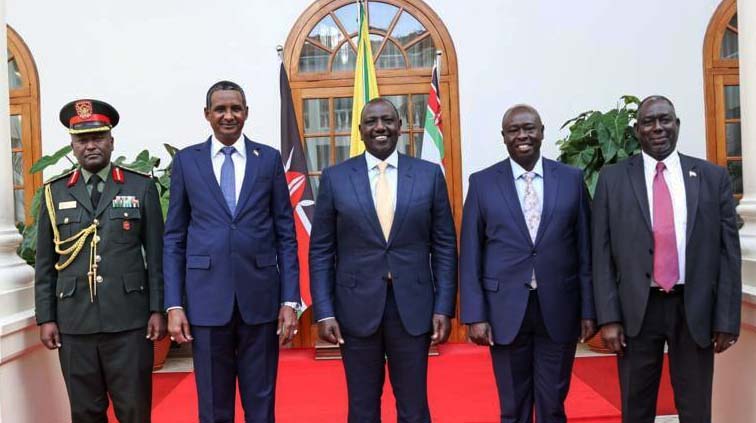A month after the Rapid Support Forces (RSF) and its allies secured a major political breakthrough with the signing of a Memorandum of Understanding (MoU) in Nairobi, Sudan’s conflict has taken a dramatic turn.
The Sudanese Armed Forces (SAF) announced on March 26, 2025, that they had recaptured the Tiba al-Hassanab camp in Jabal Awliya, previously a key RSF stronghold in central Sudan. The latest developments mark a critical shift in the power struggle between Sudan’s military and paramilitary factions, after SAF also captured the airport and Palace in Khartoum this week.
“Khartoum is free,” SAF chief General Abdel Fattah al-Burhan declared after his forces retook control of Khartoum International Airport from the RSF. The Sudanese military’s advances in the capital have dealt a significant blow to the RSF, reversing some of the paramilitary group’s earlier gains.
Kenya’s Role in the Conflict
The MoU, signed on February 22, 2025, in Nairobi, sparked diplomatic tensions, particularly with the African Union (AU), the European Union (EU), and Sudan’s military-led government. The agreement proposed a parallel government with the RSF holding 40% of key positions, the Sudan People’s Liberation Movement-North (SPLM-N) taking 30%, and the rest shared among other allied factions. The arrangement aimed to challenge Sudan’s Sovereignty Council, led by General Burhan, further deepening political divisions in the country.
“After extensive consultations, which resulted in multiple postponements of the signing, leaders from various political and civil forces, armed movements, and the Rapid Support Forces successfully announced the formation of a new government, set to be revealed within the coming days,” RSF said.
Kenya’s decision to host the RSF drew sharp criticism from regional and international players, with concerns that it could exacerbate Sudan’s conflict. The EU warned that the RSF’s plans for a parallel administration threatened Sudan’s unity and democratic transition.
“Plans for a parallel ‘government’ by the Rapid Support Forces risk partitioning the country and jeopardizing the democratic aspirations of the Sudanese people for an inclusive, Sudanese-led process that leads to civilian rule,” the EU said in a statement.
In response, Kenya defended its role, arguing that it has long provided neutral ground for Sudanese factions to engage in peace talks. Foreign Affairs Cabinet Secretary Musalia Mudavadi emphasized that Nairobi’s role was in line with its commitment to regional stability.
“We note that this is not the first time groups in Sudan have sought solutions to their crisis by leveraging the good offices of neighboring countries. Indeed, in January 2024, parties and stakeholders to the Sudanese conflict met in a neighboring country to chart a way forward on inclusive dialogue and return to civilian rule,” said Mudavadi.
“Rapid Support Forces (RSF) and Sudanese civilian groups’ tabling of a roadmap and proposed leadership in Nairobi is compatible with Kenya’s role in peace negotiations, which enjoins her to provide non-partisan platforms to conflict parties to seek resolutions.”
Kenya’s decision to host the Rapid Support Forces (RSF) in Nairobi sparked outrage, with human rights groups accusing the government of aiding a militia implicated in war crimes. The meeting, held on February 18, 2025, came just days after the African Union condemned external interference in Sudan’s conflict and called for an inclusive peace process. Critics argue that Kenya’s actions violate international law, undermine regional stability, and betray Sudanese civilians suffering under RSF-led atrocities.
“A recent report by the UN’s Independent International Fact-Finding Mission for Sudan found reasonable grounds to believe that the RSF and its allied militias committed war crimes, including rape, sexual slavery, pillage, forced displacement of civilians, and the recruitment of children under 15 for combat,” a press statement signed by the Kenyan Section of the International Commission of Jurists-Kenya (ICJ-Kenya), Africans for the Horn of Africa (Af4HA) Initiative, Atrocities Watch Africa (AWA), Betty Kaare Murungi, and Civic Freedoms Forum (CFF) said.
Others are Gest Center for Development (GESR), Grace Agenda, Kenya Human Rights Commission (KHRC), Kenyans For Peace with Truth and Justice, Kisumu CSO Network, National Victims and Survivors Network, Pan African Lawyers Union (PALU), and The Africa Centre for Open Governance (AfriCOG).
“Horrific assaults carried by the RSF and its allies against non-Arab communities – in particular the Masalit in and around El Geneina, West Darfur – included killings, torture, and other forms of sexual violence and destruction of property.”
Sudan halted all imports from Kenya in protest after Nairobi hosted members of the paramilitary, who have been engaged in a two-year civil war against the Sudanese army.
Military Shifts and Humanitarian Crisis
While the RSF seeks to expand its political influence, it is suffering major setbacks on the battlefield. The Sudanese military has reclaimed strategic sites in Khartoum, including the presidential palace and key bridges, further weakening the RSF’s hold on the capital. These gains, made in late March and early April, mark a shift in momentum after nearly two years of intense fighting.
Despite these losses, the RSF has insisted it remains a formidable force. On March 21, 2025, the group claimed to have secured the Habiba area in Gezira State and launched operations in North Darfur. However, independent reports suggest that the Sudanese military has made significant advances, forcing the RSF to retreat into isolated pockets, particularly in Darfur.
The war, which erupted in April 2023, has left more than 20,000 people dead and displaced 14 million, with some estimates pushing the death toll closer to 130,000. The United Nations has described Sudan’s crisis as the world’s largest humanitarian disaster, warning that famine and disease threaten millions.
In Khartoum, the RSF’s retreat has been marked by chaotic withdrawals.
“Watch the mass escape on foot of the remnants of the terrorist Al-Dagalo militia across the Jebel Awliya Dam Bridge. After the armed forces’ hordes forced them to abandon their equipment and gear and try to escape, wandering aimlessly, defeated,” the Sudanese Armed Forces (SAF) wrote on its official X account, SudaneseAF.
Eyewitnesses reported RSF fighters withdrawing southward toward Jabal Awliya, their last major stronghold in the capital. The Sudanese army, supported by allied militias such as the Sudan Shield Forces, has pressed forward, further tightening its grip on Khartoum.
Uncertain Future
As military clashes intensify, the RSF has announced plans to establish a “Government of Peace and Unity” in the areas it still controls. While this move is aimed at legitimizing its authority, experts warn that it may only deepen Sudan’s political divisions. With the RSF retreating into Darfur, fears of prolonged violence in the region have grown. However, some displaced residents are cautiously beginning to return to liberated areas, offering a rare glimmer of hope amid the ongoing humanitarian crisis.
International organizations, including the United Nations and the African Union, have repeatedly urged both sides to agree to a ceasefire. Humanitarian agencies warn that the conflict’s continuation threatens to push millions into famine, with one-third of Sudan’s population at risk.



